Rewilding Europe is delighted to welcome an important new member to the European Rewilding Network. Working to protect the Vjosa River, Save the Blue Heart of Europe – Albania is overseen by the NGO EcoAlbania and is the first project to join from this country. The addition takes the number of network members to 62, distributed right across Europe.
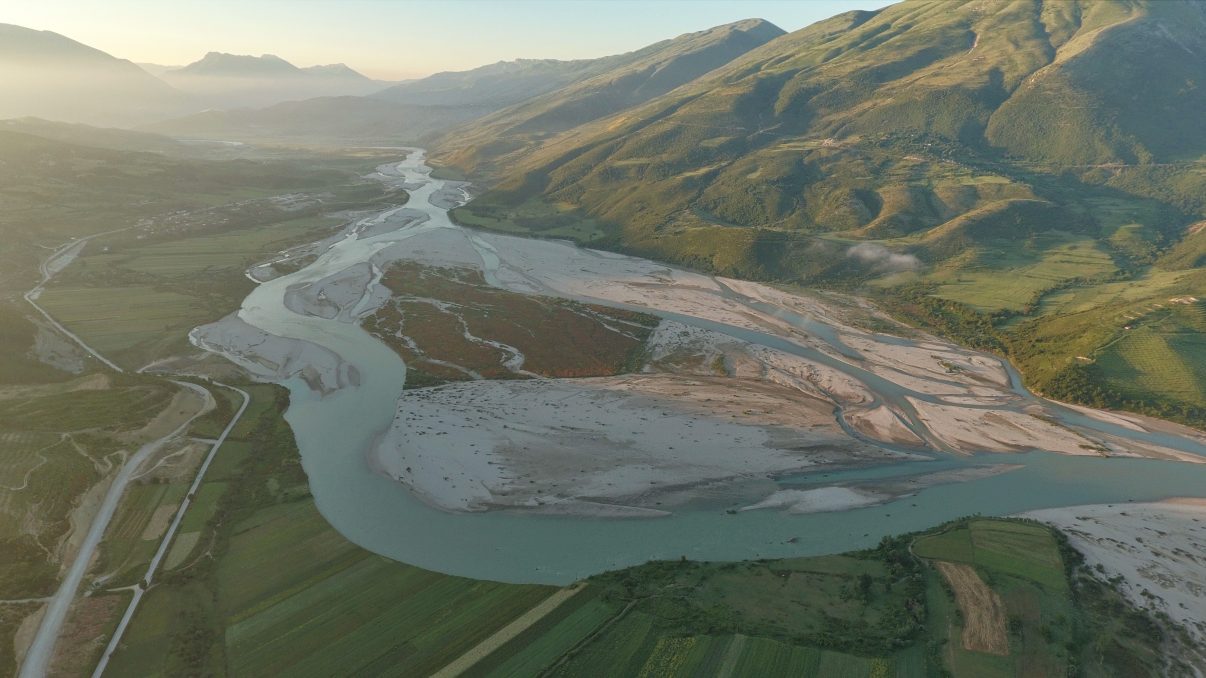
The Save the Blue Heart of Europe – Albania project has joined the European Rewilding Network, taking the number of network members to 62, spread across 27 countries (including Rewilding Europe’s eight operational areas). The aim of the project is to protect biodiversity along Albania’s Vjosa River by stopping plans for hydropower development, establishing a transboundary national park, and promoting sustainable, socio-economic development of the river and surrounding areas.
Rewilding is about reconnecting modern societies – both rural and urban – with wilder nature. While the Save the Blue Heart of Europe – Albania project focuses on protecting the Vjosa rather than rewilding it, it will generate a sense of pride, common ownership and responsibility for wild nature amongst land owners, communities and resource users. This will hopefully lead to the development of nature-based economies tied to sustainable use of the river and the riverine environment.
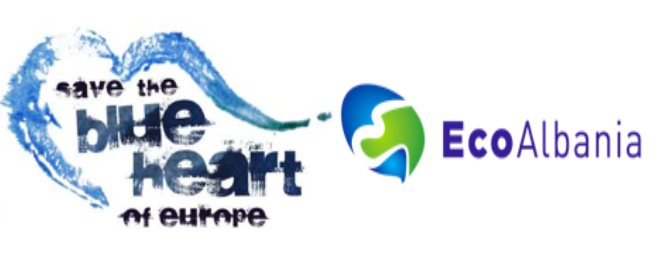 The Balkan Peninsula is home to numerous wild rivers and streams, extensive gravel banks, pristine alluvial forests and spectacular waterfalls. These waterways host 69 endemic fish species, while more than 40% of all of Europe’s endangered freshwater mussels and snails can be found in these freshwater systems. The biodiversity of these rivers and connected habitats, as well as livelihoods in local communities, is threatened by nearly 2,800 hydropower plants projected and planned for development over the next few years.
The Balkan Peninsula is home to numerous wild rivers and streams, extensive gravel banks, pristine alluvial forests and spectacular waterfalls. These waterways host 69 endemic fish species, while more than 40% of all of Europe’s endangered freshwater mussels and snails can be found in these freshwater systems. The biodiversity of these rivers and connected habitats, as well as livelihoods in local communities, is threatened by nearly 2,800 hydropower plants projected and planned for development over the next few years.
The Save the Blue Heart of Europe campaign has been launched by Vienna-based NGO RiverWatch and German NGO EuroNatur, in collaboration with local partners. It concentrates on four key areas that are particularly valuable: the Vjosa River in Albania, the Mavrovo National Park in Macedonia, the Sava River in Slovenia, Croatia, Bosnia and Herzegovina and Serbia, as well as the rivers of Bosnia and Herzegovina. All of these are threatened by large dam projects. The campaign’s overall goal is to protect the biodiversity of Balkan rivers by halting widespread dam construction.
American outdoor clothing and equipment company Patagonia are also supporting the Save the Blue Heart of Europe campaign. The company recently released a documentary on the subject called Blue Heart, which is now being screened across the world. A trailer can be viewed here.
Wild waterway
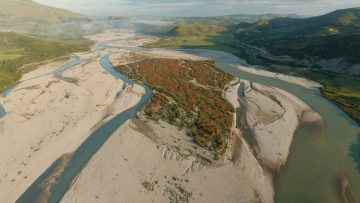
Untamed and free-flowing, the Vjosa represents one of the last wild river ecosystems in Europe. It rises in Greece, where it is called the Aoos, and runs for 80 kilometers before it reaches Albania. Here it continues for another 190 kilometers before emptying into the Adriatic Sea. In Albania the river is characterised by beautiful canyons, braided river sections, islands and stretches, while in some areas the riverbed expands to more than 2 kilometres in width. Almost all of the Vjosa’s tributaries are free-flowing and intact, constituting an incredible living rivers network.
The Save the Blue Heart of Europe – Albania project is being coordinated by EcoAlbania (the Center for the Protection of Natural Ecosystems in Albania), an Albanian NGO created as a joint initiative of the University of Tirana and the Save the Blue Heart of Europe team.
Thanks to the effort of EcoAlbania and other partner, representatives of the Bern Convention – one of the most important nature conservation conventions for the protection of biodiversity in Europe (to which Albania is a signatory) – visited the Vjosa in June. At an on-the-spot appraisal, Iva Obretenova from the convention secretariat stressed the unique and rich biological diversity of the river. EcoAlbania’s efforts also led to a court ruling in May 2017 ordering a halt to construction of the Poçem hydropower plant on the Vjosa, being the first environmental court case in Albania
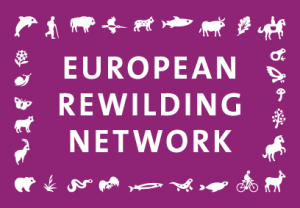 The Save the Blue Heart of Europe – Albania project is scheduled to end in 2020. Until then, the following outcomes are being targeted: the establishment of a Vjosa transboundary national Park, the banning of all hydropower plants on the river, the creation of a strategy for nature-based tourism development in the Vjosa Valley, and the closure of knowledge gaps regarding the river’s geomorphology and biodiversity through scientific surveys and studies.
The Save the Blue Heart of Europe – Albania project is scheduled to end in 2020. Until then, the following outcomes are being targeted: the establishment of a Vjosa transboundary national Park, the banning of all hydropower plants on the river, the creation of a strategy for nature-based tourism development in the Vjosa Valley, and the closure of knowledge gaps regarding the river’s geomorphology and biodiversity through scientific surveys and studies.
To this end, Valentina Kabili, project coordinator for EcoAlbania, is excited to be joining the ERN.
“We want to protect the Vjosa for the benefit of both wild nature and the people for whom this river has a deep symbolic, traditional and cultural value,” she says. “We are delighted to become members of the European Rewilding Network and are excited to share our experience and expertise in lobbying international institutions and engaging local communities in nature conservation.”
Scaling up rewilding
Rewilding Europe is part of a burgeoning pan-European rewilding movement which has seen many impressive and inspiring initiatives develop over recent years. With rewilding-related projects continuing to multiply and flourish across the continent, the objective of the ERN is to connect, support and strengthen them.
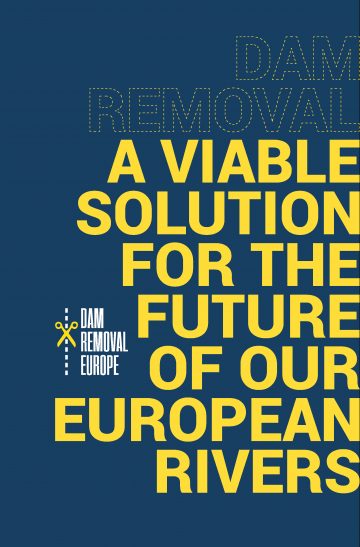
The ERN has displayed impressive growth since its launch at the WILD10, the World Wilderness Congress in Salamanca in October 2013. It operates on a stronger together philosophy, promoting rewilding as a conservation approach. Members meet regularly – usually via webinar – to share knowledge, insight and examples of best practice.
Rewilding Europe extends a warm welcome to all rewilding initiatives and encourages them to apply for membership of the ERN. Please view this page for more information on application.
With the biodiversity along European rivers decreasing by over 80% over the last 40 years, the need to halt and reverse this decline is now imperative. The removal of dams has proven to be the most environmentally efficient and cost-effective measure for river restoration.
It is for this reason that Rewilding Europe recently became a partner in Dam Removal Europe (DRE), a European-wide coalition of organisations working to restore European rivers by removing old and obsolete dams and weirs. The other DRE partner organisations are the World Fish Migration Foundation, World Wildlife Fund (Netherlands, Finland and Switzerland), European Rivers Network, Rivers Trust and Karlstad University.
